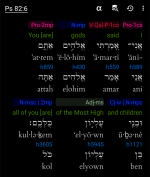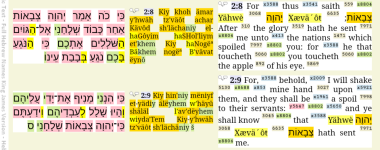Because you say so?
Just read the verse. It says exactly what Dominic pointed out. No twisting involved:
For
thus says the Lord of hosts: “He sent Me after glory, to the nations which plunder you; for he who touches you touches the apple of His eye. For surely I will shake My hand against them, and they shall become spoil for their servants. Then you will know that
the Lord of hosts has sent Me.
For thus says the Lord of hosts: “He sent Me after glory, to the nations which plunder you; for he who touches you touches the apple of His eye. For surely I will shake My hand against them, and they shall become spoil for their servants. Then you will know that the Lord of hosts has sent Me.

www.biblegateway.com
The suffix -im in Hebrew denotes plurality.
Cherub, cherubim.
Seraph, seraphim.
Naphil, nephilim.
Elohim is no different.
Eloah, elohim.
The Hebrew word bara (which is translated as "created" in English) is a singular verb.
You're basically claiming that Moses, a well educated man, educated as a prince of Egypt, made an error in the very first verse in the Bible, the verse that is by far the most studied verse in all of scripture.
Are you really going to claim that he made such a basic grammatical error, and that such a supposed error has gone unnoticed by anyone for more than 3500 years?
No, that grammar structure was intentional. "In the beginning Gods <- [He] created the heavens and the earth."
Add to this the verses
@Right Divider has been giving you, and it makes sense that God is the origin of the "royal we," because He IS a plural unity.





